Worker Well-Being Program
Tri-Impact envisions sustainable development through an integrated approach that benefits people, protects the planet, and fosters prosperity for present and future generations. The worker well-being program is designed to improve the overall health, happiness, and social security of workers and farmers. The program focusses in providing support to workers and artisans to ensure their upward economic mobility in life. The program provides financial literacy to the workers and facilitates to open saving bank accounts. Besides, the program spreads awareness among the workers regarding government social security schemes and facilitates linking to them. The program also takes care of the health of the workers and artisans by organizing eye screening and health diagnostic camps.
Why Worker Well-Being Is Important?

The global demand for Indian textiles is substantial and growing. India’s textiles and apparel industry is a significant contributor to the global market, accounting for approximately 4% of global trade in textiles and apparel. The industry is projected to reach $100 billion in exports by 2030, indicating robust international demand. Approximately 45 million people are employed in the textile business, including 3.5 million artisans working on handlooms. These artisans, known for their unique cultural value and sustainable production methods, are in high demand internationally. However, most of these artisans belong to marginalized sections of society.
Worker well-being is particularly crucial for marginalized people as they are the most vulnerable in our country. They are the backbone of the economy yet are often exploited, especially in terms of wages and workload. Ensuring their well-being leads to more equitable, inclusive, and productive workplaces. Achieving adequate social security coverage for all workers requires significant coordinated efforts, a proven program approach, and additional financial investments. According to NITI Aayog, India needs to invest 13% of its GDP into social causes by 2030 to achieve its United Nations Sustainable Development Goals (SDG) commitments; the current average is about 7%. The Aayog emphasizes that philanthropy plays a significant role in accelerating inclusive and sustainable economic growth.
Marginalized workers, artisans, and farmers have low coverage and knowledge about the banking system, hindering effective saving. Lack of financial inclusion makes them ineligible for government-provided social security and welfare schemes. Preventive health checkups, including eye health, blood sugar, and blood pressure screenings, are still unavailable to many marginalized workers and farmers. For workers from marginalized farming backgrounds, climate-induced changes have increased their vulnerability. Climate change has led to crop failures, water shortages, landslides, recurrent floods, high food price inflation, and food insecurity, disproportionately affecting marginalized workers and farmers.
Despite their exceptional skills, many artisans live in poverty, with little access to healthcare or social security benefits. Improving their working conditions is crucial for preserving these traditional crafts.” – International Labour Organization (ILO)
The Objectives and Activities Of The Worker Well-Being Program
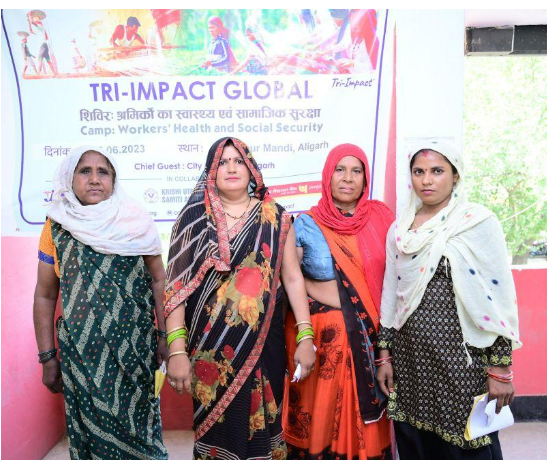
Tri-Impact has devised strategic interventions to support workers, weavers, and artisans in their journey toward economic, social, and physical well-being:
Financial Inclusion and Social Security Program: By building stakeholder collaborations at the grassroots level, we provide workers with essential support to achieve financial literacy, effectively open and operate their bank accounts, and connect with government social security schemes. This comprehensive assistance ensures that workers and their families benefit from financial services and social security programs, with ongoing support to maintain their participation in these schemes.
Eye Health and Vision Care: Through stakeholder collaborations, we support workers in taking care of their eye health and eyesight by organizing regular eye screenings and distributing eyeglasses.
Access to Health Services: We facilitate workers’ access to health services by utilizing government health infrastructure and building hyperlocal collaborations with health service providers to offer primary diagnostic services.
Enhancing Livelihoods Opportunities and Wages in the Heritage Textiles Sector: We support workers, weavers, and artisans in obtaining better livelihood opportunities and wages through several interventions. These include raising consumer awareness about authentic heritage textiles, counterfeit products available in the market, the critical role of skilled workers, enhancing skills and knowledge regarding the latest trends, colors, and designs in their crafts, advocate for better wages, and emphasize on improving working conditions.
How Worker Well-Being Program Achieves Its Goals
The Worker Well-Being Program connects local, national, and international support systems for workers and marginalized communities, translating them into actionable steps. Its emphasis on hyperlocal collaborations is essential for effectively supporting marginalized communities of artisans and farmers. The importance of hyperlocal collaborations can be summarized as follows:
- Hyperlocal Collaborations Provide Tailored Solutions: Hyperlocal collaborations allow for solutions specifically tailored to the unique needs of artisans and farmers within a community, ensuring that interventions are relevant and effective.
- Hyperlocal Collaborations Build Trust and Accessibility: Local partnerships with NGOs, university volunteers, and businesses build trust within the community, making it easier for individuals to access and participate in the program’s offerings.
- Hyperlocal Collaborations Promote Efficient Resource Utilization: By utilizing existing local resources and infrastructures, the program maximizes efficiency and minimizes costs, ensuring that more resources directly benefit the target communities.
Collaboration between the government, NGOs, and the private sector is vital to improving the lives of workers in the heritage textiles sector. Together, we can create a sustainable and equitable future for these artisans.” – World Fair Trade Organization (WFTO)
Our Programs:
Eye health awareness, eye screening, and eyeglass distribution
According to a study by the All India Institute of Medical Sciences (AIIMS), nearly 30% of artisans in the textile sector suffer from vision-related issues. Furthermore, the World Health Organization (WHO) reports that uncorrected refractive errors are the leading cause of visual impairment globally. Addressing these issues is crucial for the well-being of these workers and the preservation of our heritage textiles.
Eye health and eye screening are crucial for workers involved in heritage textiles production for several reasons: i) Heritage textiles, such as intricate embroidery, weaving, and other detailed work, require sharp vision for accuracy. Poor eye health can lead to mistakes and lower-quality products, ii) Workers often need to focus on small, detailed patterns for long periods. Good eye health ensures they can maintain this focus without excessive strain, reducing fatigue and improving productivity, iii) In textile production, workers use sharp tools and machinery. Good vision helps in avoiding accidents and injuries, ensuring a safer working environment, iv) Regular eye screenings can detect issues like myopia, hyperopia, and other vision problems early. Addressing these issues promptly can prevent them from worsening and causing significant health and work-related issues. Good eye health is part of overall well-being. Workers who can see well are likely to be more comfortable, less stressed, and more satisfied with their work, contributing to a better quality of life and higher job satisfaction.
Our eye health program includes the following activities:
- Regular Screenings: We schedule regular eye health check-ups for workers, ideally annually, to monitor and address any emerging issues.
- Providing Eyeglasses: We ensure eye glass distribution after screening, if suggested by the expert, to the most marginalized workers.
- Proper Lighting: We ensure workspaces are well-lit to reduce eye strain and make detailed work easier.
- Breaks and Exercises: We encourage regular breaks and eye exercises to reduce strain.
- Protective Equipment: We provide protective eyewear if workers are exposed to hazards that could damage their eyes, such as dust or sharp particles.
- Access to Care: We facilitate access to eye care services and corrective lenses for workers who need them, possibly through partnerships with local healthcare providers
Prioritizing eye health and regular screenings for heritage textile workers is not just a matter of health and safety but also one of enhancing productivity, quality of work, and overall well-being. Implementing comprehensive eye care programs can lead to a healthier, happier, and more efficient workforce.


Financial Inclusion, and Social Security Program
Financial literacy, financial inclusion, and social security are critical elements in promoting the well-being of marginalized workers and farmers. These components provide the foundation for economic stability, poverty reduction, and social equity, fostering a more inclusive and sustainable society.
Firstly, financial literacy equips marginalized individuals with the knowledge and skills to manage their finances effectively. This education enables them to make informed decisions regarding savings, investments, and borrowing, which are essential for economic security. Financially literate individuals are better prepared to navigate financial challenges and opportunities, contributing to their overall economic resilience.
Secondly, financial inclusion ensures that marginalized workers and farmers have access to essential financial services such as banking, credit, and insurance. This access is crucial for economic participation and growth, allowing individuals to save securely, invest in productive activities, and protect themselves against risks. Financial inclusion bridges the gap between the formal financial system and marginalized communities, fostering economic integration and empowerment.
Lastly, social security systems provide a safety net for marginalized workers and farmers, protecting them from economic shocks and uncertainties. These systems, including pensions, accidental insurance, and health insurance, offer vital support during times of need, reducing vulnerability and promoting social stability. Social security enhances the quality of life for marginalized individuals and their families, ensuring that they can maintain a basic standard of living even in adverse circumstances.
Our Financial Inclusion and Social Security Program includes the following activities:
- Financial Literacy Workshops: We conduct regular workshops to educate marginalized workers and farmers on the importance of bank accounts, savings, and financial planning. These sessions equip participants with the necessary knowledge to manage their finances effectively and make informed decisions.
- Support in Opening and Maintaining Bank Accounts: We collaborate with local communities of artisans and workers, local businesses, and banks to assist in opening and operating bank accounts. By providing guidance and support, we ensure that these individuals can navigate the banking system efficiently and benefit from financial services.
- Awareness Activities Regarding Social Security Schemes: We organize workshops and other awareness-building activities to highlight the benefits of health, accidental, crop, and life insurance. These sessions also inform participants about various government schemes designed to support marginalized communities, ensuring they are aware of the available resources.
- Social Security Enrolment Drives: We facilitate the enrollment of marginalized workers and farmers in social security programs by simplifying registration processes. We engage stakeholder such as banks, customer service providers, volunteers, NGOs, local businesses, and government departments to provide comprehensive assistance and ensure smooth enrollment in these crucial programs.
Collaboration between the government, NGOs, and the private sector is vital to improving the lives of workers in the heritage textiles sector. Together, we can create a sustainable and equitable future for these artisans.” – World Fair Trade Organization (WFTO)



Access to Health Services

Health diagnostic camps are critical in addressing the healthcare needs of marginalized workers in the heritage textile sector. These workers often face severe health risks due to exposure to hazardous materials, strenuous working conditions, and limited access to medical facilities. Implementing regular health camps can help in early detection of diseases, promoting better health practices, and improving overall well-being.
Why Health Diagnostic Camps are important?
Early Detection and Treatment: Many workers suffer from chronic illnesses such as respiratory problems, musculoskeletal disorders, and skin conditions. Health camps can facilitate early detection and timely treatment of these ailments, reducing the risk of complications.
Awareness and Education: Health camps includes educating workers about the importance of hygiene, preventive healthcare, and occupational safety. This knowledge can empower them to take proactive steps in maintaining their health.
Accessibility: Marginalized workers often lack access to healthcare services due to financial constraints and geographical barriers. Health camps bring medical services directly to their workplaces and communities, ensuring they receive the care they need.
Our Access to Health Services Program includes the following activities:

- General Health Check-ups: Routine examinations including blood pressure, sugar levels, and BMI assessments.
- Health Counseling and awareness: Importance of regular diagnostic tests, awareness regarding blood sugar level, blood pressure, lipid profile etc.
- Nutritional Advice: Information on maintaining a balanced diet, which is crucial for sustaining the physical demands of their work.
- Gender-Specific Health Issues: Women in the heritage textile sector often face health issues such as anemia, malnutrition, and mental health problems. Awareness and early intervention are vital in addressing these concerns. Many women in marginalized communities lack access to healthcare services due to cultural, financial, and logistical barriers. Tri-Impact keep a lady doctor in its health camps to provide a platform for women to receive necessary care and information.
Enhancing Livelihoods Opportunities and Wages in the Heritage Textiles Sector:
The heritage textiles sector, known for its rich cultural history and craftsmanship, often employs marginalized communities. Despite their skills, workers in this sector frequently face low wages and limited demand of their products due to counterfeit products in the market. Enhancing their economic conditions is crucial for preserving this cultural heritage and improving their quality of life.
Enhancing livelihood opportunities is also crucial since most Heritage Textile products such as Banarasi Sarees face declining population of artisans (ex weavers). This is due to the reason that the younger generations are increasingly moving away from weaving due to better opportunities in other fields. This results in a decline in skilled weavers who can continue the tradition.
This program includes the following activities:
- Spread awareness of different Heritage textiles, their significance, and cultural and historical values.
- Influence consumers to change their preference from fast fashion to more sustainable and durable heritage textiles.
- Make consumers aware of counterfeit products and how should they distinguish between genuine and counterfeit heritage textiles.
- Support government-issued certifications and labels. Spread information about these certifications among the consumers. Encourage artisans and micro-entrepreneurs to make best use of government certifications that help identify product as genuine heritage textiles.
Above awareness and promotion of government-issued certifications and labels could be possible through organization’s social media accounts and by participating in exhibitions.
Tri-Impact Partnership with Hyundai Motor India Foundation to promote art and artists

Under the global brand vision of “Progress for Humanity” Hyundai Motor India Foundation, the CSR arm of Hyundai Motor India Ltd granted funds to Tri-Impact for the promotion of “Art for Hope”.
Art for Hope held an exhibition to showcase masterpieces created by various artists who participated in this program. The exhibition was held at Triveni Kala Sangham, Mandi House, New Delhi from 27th March 2024 to 31st March 2024. The exhibition was inaugurated on 27th March 2024 where Ms Kamalini and Ms Nalini Asthan, Kathak Artists and Padma Shri awardees were invited as Chief Guest. Also present were Mr Un Soo Kim,Managing Director / CEO, Hyundai Motor India Ltd., Mr Gopala Krishnan CMO, Hyundai Motor India Ltd and Trustee, Hyundai Motor India Foundation and Mr. Puneet Anand, Asst. Vice President and Group Head, Corporate Affairs, Hyundai Motor India
Exhibition at Triveni Kala Sangham


During the exhibition
- Tri-Impact showcased Banarasi Sarees made by weavers during the project period.
- A documentary film was screened showing how the Banaras Sarees are hand woven, the challenges being faced by the artists who have been making Banarasi sarees for decades, and how this heritage textiles is facing near extinction due to fast fashion trends, counterfeit products in the market and less keenness of today’s youth to adapt these skills to continue the heritage. The film also showcased solutions provided by the government such as certifications like Silk Mark.
- A lecture to bring awareness regarding authentic and counterfeit heritage textiles, government certification programs silk Handloom Mark and Silk Mark to protect authentic heritage textiles, the importance of heritage textiles how the age-old tradition is dying out due to challenges being faced by artisans and weavers.

Some Testimonials of Program Beneficiaries
Testimonials from Banarasi Saree Clusters:
Workers of Afreen Handloom Lohta Varanasi-
- Janul Abdeen 60 years resident of Dhamaria, Lohata, Varanasi
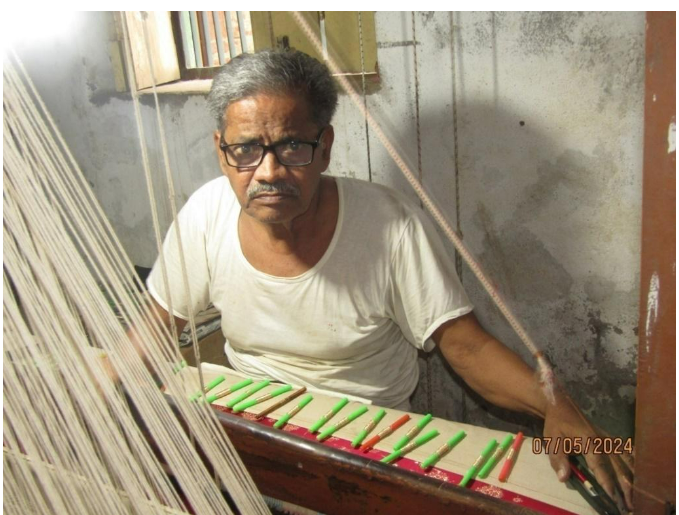
He has been doing weaving work on handloom for the last 40 years. He says (In local language – Hindi) “ये विगत 40 वर्षो से हथकरघे पर बुनाई का काम कर रहे है.इनका कहना है की “अभी तक हम बुनकरों के पास कोई भी आँख की जांच करे नाही आवा रहा एक बार हम चश्मा बनवावा रहा जम्में 500 रुपइया लगा रहा ओके टूटे के बाद बिना चश्मा के बिनत रहे आप लोग के कैंप में जांच कराये के फ्री में चश्मा मिला है अब वही चश्मा लगा के बिनकारी करत है और अब महीन धागा भी दिखत है अइसन जांच और जगह भी करावा ताकि दूसरे बुनकरों के भी को फायदा मिले”
Translated version in English:
He says, “Till now no one has come to us, weavers, to check our eyes. Once I got the glasses made, I paid Rs. 500, but it broke and since then I weaved without glasses. I got my eyes checked in your camp and got free glasses. Now I weave with those glasses and can see even fine threads. You should organize these camps at other places too so that other weavers can also get their eyes checked and benefit from it”.
2. Sanjeeda Baano, 36 years, resident of Dhamaria Lohta, Varanasi.
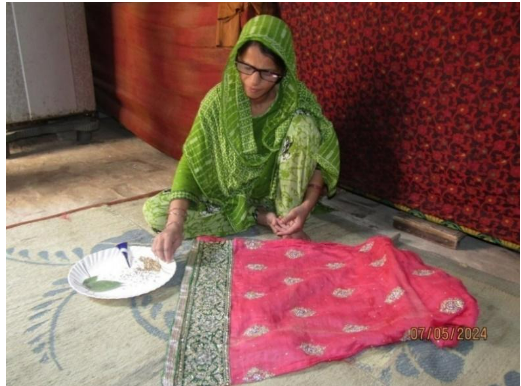
She has been doing stone or embroidery work on fabrics and when she doesn’t have much work, she does stitching at home. She says (in local hindi language): “जब सिलाई के दौरान मशीने का धागा टूट जात रहा तो हम धागा नाही डाल पावत रहै चश्मा लगावे से हम्मै पास का एकदम साफ दिखत है अउर मशीन में धागा भी डाल लेई ला और साड़ी में टिक्की लगाना भी आसान हो गवा अब हमें कोई परेशानी नहीं है। आँखों के जांच का अभई तक यहाँ एको कैंप नहीं लगा रहा यहाँ कैंप लगे से अउरत लोग भी जांच कराये लेहिन आप सभी लोगो को बहुत बहुत शुक्रिया”
Translated version in English:
“While stitching, if thread breaks, I was unable to put sewing thread inside the needle. Now that I got glasses (provided in the camp) I can easily insert thread in the needle and can also do embroidery work with ease. Till now no one ever organized any eye camp in our area. Due to this camp, even ladies can get their eyes tested. Thank you so much to all of you”.
3. Rofaida Bibi, 35years resident of Dhamaria, Lohata, Varanasi.
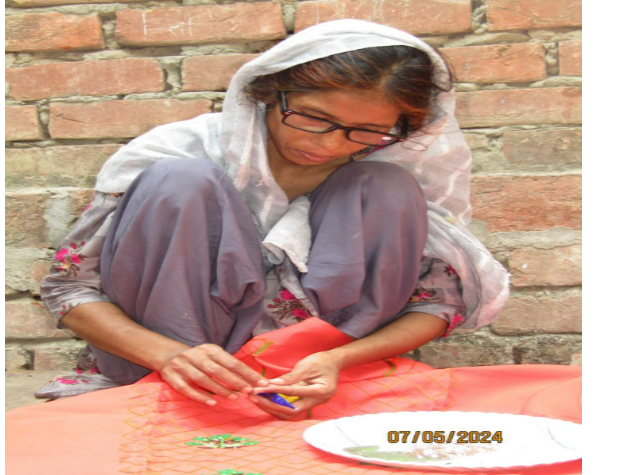
She has been doing the work of fixing stones/tikkis in sarees for the last 4-5 years. Due to continuous work, her eyes had become weak but till now she had not got her eyes checked. When an eye check-up camp was organized by Tri-Impact in her locality, she got her eyes checked in that camp and got free spectacles. Regarding the camp she said that ““हम्मे जो चश्मा मिला है उ एकदम फिट है कोई दिक्कत नहीं है चश्मा लगावे के बाद बहुत साफ़ दिखत है अब हम बहुत अच्छे ढंग से काम करी थे, इ बहुत बारीक काम है बिना चश्मा के काम में दिक्कत होत रही आप लोगो ने हम जैसे गरीब बुनकरों के लिए बड़ा ही नेक काम किया है “
Translated version in English: “The glasses I have received fit perfectly. There is no problem. After wearing the glasses, I can see very clearly. Now I can do the work very well. This is a very delicate work. Without the glasses, I was facing difficulty in working. You people have done a great job for poor weavers like us.”
4.Mohammad Naseem, 46 years, resident of Dhamaria, Lohata, Varanasi.
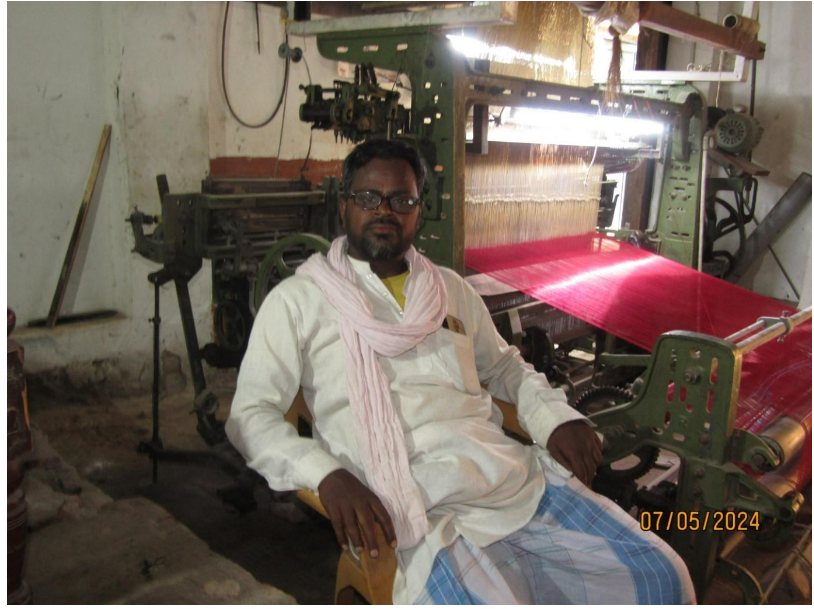
In his own words ““हमारा काम पावर लूम का है काम के दौरान जब धागा टूट जाता था तो उसे जोड़ने में दिक्कत होती थी हालांकि हमारे पास पुराना चश्मा था लेकिन ठीक से काम नहीं कर रहा था कैंप में सही ढंग से आंख की जांच के बाद जो चश्मा मिला है वो बहुत फिट है और उससे एकदम साफ़ दीखता है।अब टूटा हुआ धागा आसानी से जोड़ लेते है । मेरे हिसाब से बुनकरों के लिए इस तरह का कैंप दूसरे बुनकर एरिया में भी लगना चाहिए इससे गरीब बुनकरों को फायदा पहुंचेगा”।
Translated version in English: ““Our work is of power loom. When the threads used to break during work, there was a problem in joining it. Although I had old glasses, they were not working properly. After proper eye examination in the camp, the glasses I got fit very well and I can see very clearly through them. Now I can join the broken threads easily. According to me, such camps for weavers should be organized in other weaving areas as well. This will benefit the poor weavers.”
5. Julekha Bano, 46 years, resident of Sarainandan Bajardhiha, Varanasi
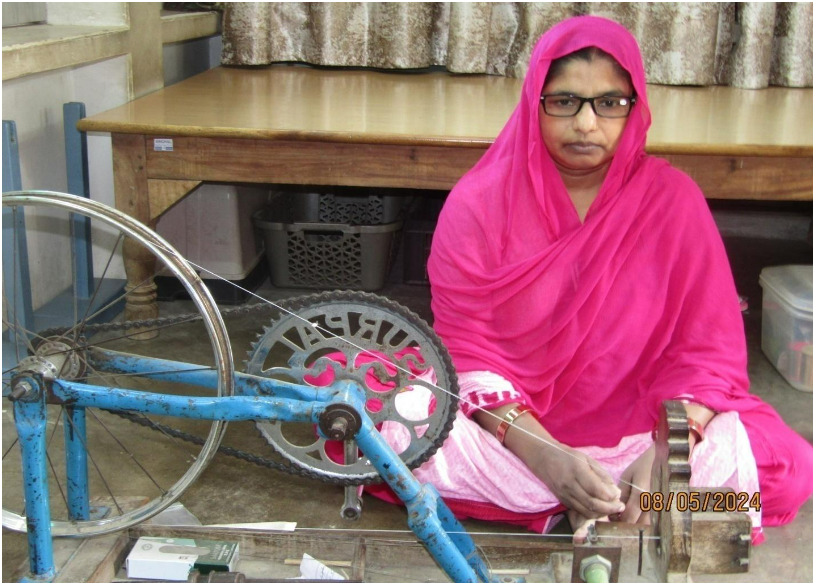
She has been doing the work of reel winding for past 15-16 years. She says ““पहले हम्मे इस काम में दिक्कत होत रही काहे की हमरी पास की नज़र कमज़ोर रही अउर सर में दरद भी होत रहा जबसे चश्मा लगावे शुरू किया है काम आसान हो गवा है काम में तेजी भी आवा है हमरा चश्मा बहुत ठीक है अइसही आगे भी आँख की जांच करत रहेव”
Translated version in English: “Earlier I used to face difficulty in doing this work because my near vision was weak and I also used to have headache. Since the time I started wearing glasses, work has become easier and work has also become faster. My glasses are very good. Similarly, I will keep getting my eyes checked in future as well.”
6. Aquib Javed, 26 years, resident of Sarainandan, Bajardhiha, Varanasi.
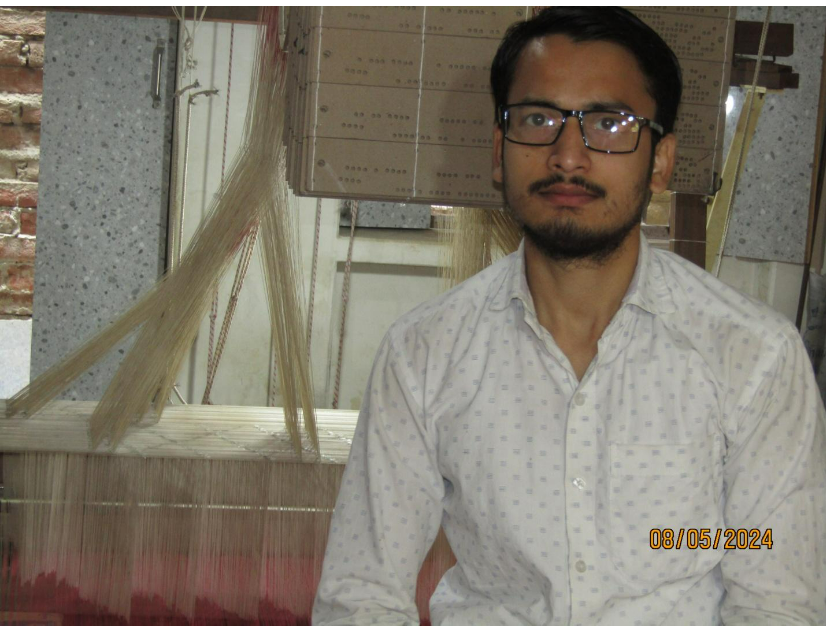
He has been weaving on handloom for last 16 years. He tells “अक्सर सर में भारीपन रहता था तथा दूर की चीज धुंधली दिखायी देती थी जब आप लोगो द्वारा लगाए गए आँखों के कैंप में आकर जांच कराया तो पता चला की मेरी दूर की नज़र कमज़ोर है उसके कुछ दिनों बाद मुझे मुफ्त में चश्मा मिला जिसकी क्वालिटी भी अच्छी है। चश्मा लगाने से मेरे दूर की नज़र भी सही हो गयी और सर का भारीपन भी ख़तम हो गया अब जब मुझे बाहर मैदान में तानी फैला कर लपेटना होता है तो ये काम चश्मा लगा कर करते है इससे दूर फैली तानी में क्या गड़बड़ी है साफ़ नज़र आती है। आप लोग बुनकरों के लिए नहुत अच्छा काम कर रहे है”
Translated version in English: “I often felt heaviness in my head and could see distant objects blurry. When I went to the eye camp organised by you people and got myself examined, I found out that my distant vision is weak. A few days later, I got free spectacles whose quality is also good. By wearing the spectacles, my distant vision also improved and the heaviness in my head also vanished. Now, when I have to spread and wrap the warp in the field, I do this work wearing spectacles. Whatever is wrong with the warp spread far away is clearly visible. You people are doing a great job for the weavers.”
7.Najma Khatoon, 46 years, resident of Sarainandan, Bajardhiha, Varanasi.
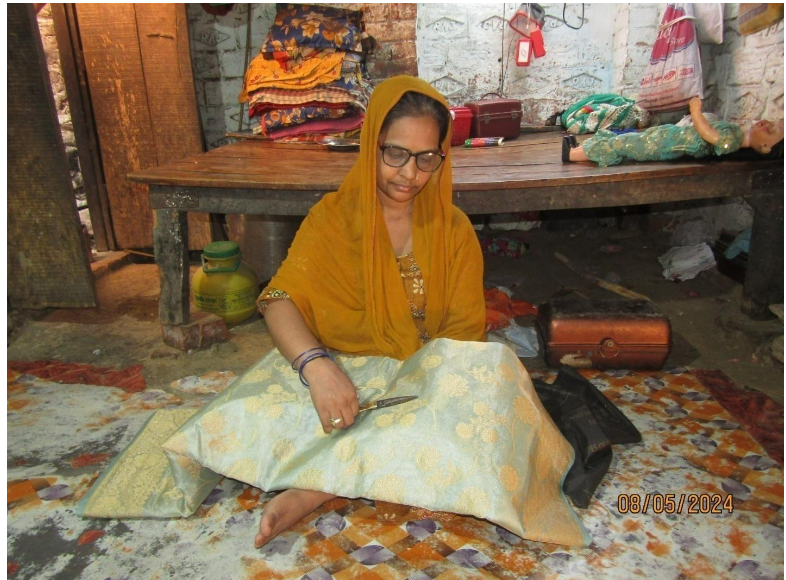
She says, ” हम आठ -दस साल से साड़ी की फिनिशिंग करत है महीनी काम लगातर करत करत हमरी पास की नज़र कमज़ोर हो गयी रही तीन साल पहले चश्मा भी बनवाया रहा जिम्मे 700 का खर्चा आवा रहा लेकिन कुछ दिन लगाने के बाद चश्मा फिट नहीं भवा ओकरे बाद चश्मा लगावे छोड़ दिया लेकिन जब पता चला की हमरे मोहल्ले में आँखों की मुफ्त जांच होत है तो हमउ आँख की जांच करावा जिम्मे पता चला कि हमरे आँख का पावर पहिले से बढ़ गवा है ओके बाद हमें चश्मा मिला ओके लगावे से एकदम साफ़ दिखत है और फिनिशिंग /कटिंग भी बढ़िया ढंग से करत है और सबसे ख़ुशी की बात इ है की हमरा एक्को पैसा नाही लगा”।
Translated version in English: “I have been doing saree finishing for the last eight to ten years. Due to continuous work for months, my near eyesight became weak. Three years ago, I got glasses made which cost Rs. 700 but after wearing them for a few days, they did not fit. After that, I stopped wearing glasses but when I came to know that free eye check-up is done in my locality, I got my eyes checked and found out that my eye power had increased. After that, I got glasses which allow me to see clearly and can also do finishing/cutting very well and the happiest thing is that I did not spend a single penny.”
8. Imran Akhtar, 24 years, resident of Sarainandan, Bajardhiha, Varanasi
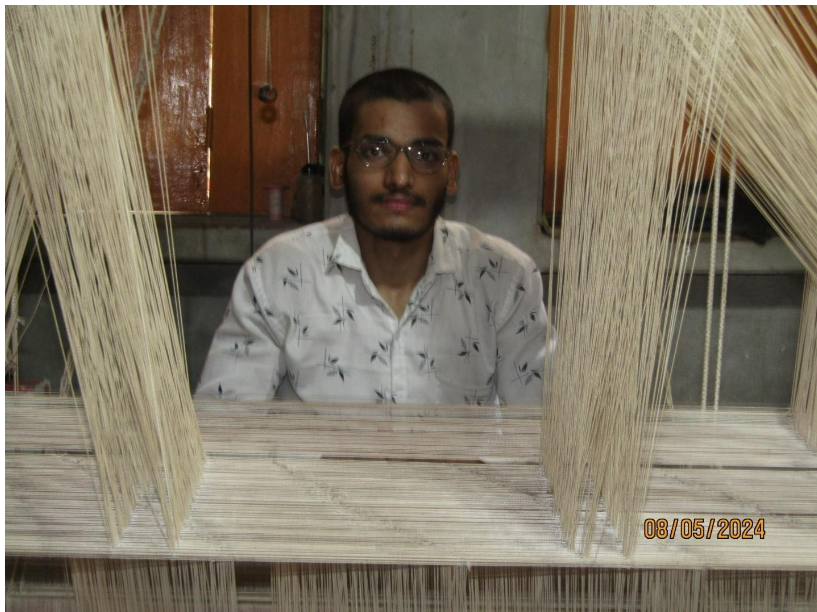
During our discussion, Imran said, “मुझे दूर की चीजे साफ़ नहीं दिखती थी जिसकी वजह से हमें जब हमें बाहर तानी फैला कर उसको सुलझाना /लपेटना होता था तो मुझे काम में परेशानी होती थी और समय भी ज्यादा लगता था लेकिन जब से आप के संस्था के जरिये मुझे चश्मा मिला है काम में बहुत आसानी हो गयी है और चश्मे से दूर की चीजे बहुत साफ़ दिखाई देने लगी ये चश्मा हमारे लिए बिलकुल सही है। जब हम घर से बाहर निकलते है तो चश्मा लगा लेते है इससे हमारी आँखों की सुरक्षा भी होती है आप से गुजारिश है की इसी तरह के कैंप के जरिये सभी बुनकरों को फायदा पहुचाइए”।
Translated version in English: “I was not able to see distant objects clearly. Due to this, when we had to spread the warp and untangle/wrap it, I used to face difficulty in working and it used to take more time as well. But since I have got glasses through your organisation, my work has become very easy and I can see distant objects very clearly. These glasses are perfect for us. When we go out of the house, we wear glasses. This also protects our eyes. I request you to benefit all the weavers through similar camps.”

